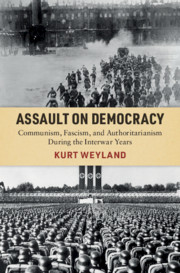
- Cited by 3
-
Cited byCrossref Citations
This Book has been cited by the following publications. This list is generated based on data provided by Crossref.
Weyland, Kurt 2021. Firmer Roots of Ethnicity and Nationalism? New Historical Research and Its Implications for Political Science. Perspectives on Politics, Vol. 19, Issue. 2, p. 564.
Skaaning, Svend-Erik 2023. Democracy under pressure: historical lessons for current challenges?. Italian Political Science Review/Rivista Italiana di Scienza Politica, Vol. 53, Issue. 2, p. 239.
Bersch, Katherine and Lotta, Gabriela 2024. Political Control and Bureaucratic Resistance: The Case of Environmental Agencies in Brazil. Latin American Politics and Society, Vol. 66, Issue. 1, p. 27.
- Publisher:
- Cambridge University Press
- Online publication date:
- February 2021
- Print publication year:
- 2021
- Online ISBN:
- 9781108943642


